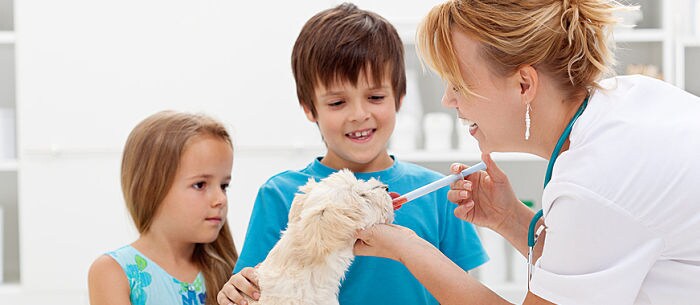Virus and flu season for your family is annoying, with sick hands and tissues everywhere. Your dog can get viruses through many of the same avenues you do, though in your dog’s case it is through bodily fluid or sputum from other dogs. One big virus you might be concerned about is canine parvovirus, since the disease is highly contagious and attacks cells all over the body.
What Is Canine Parvovirus?
Parvovirus in dogs is a highly contagious virus that can make your dog really sick; if left untreated, it can be fatal. It is therefore important to be aware of the symptoms and be ready to contact your vet immediately should you notice any in your dog. Symptoms of canine parvovirus include vomiting, lethargy and loose grey stools.
Luckily, you can help protect your dog from canine parvovirus by making sure they get their puppy vaccinations. Since the virus can live for up to six months outside of a host, it’s important to keep an unvaccinated dog away from dog parks — especially if they’re a puppy.
If your dog contracts the virus, treatment involves supporting their system with IV fluids and anti-nausea drugs. Owners of a dog with parvovirus are responsible for preventing it spreading to other dogs: do not take your sick or unvaccinated dog to places busy with dogs, like parks and pet shops.
Other Serious Viruses In Dogs
Here are five other canine viruses you should know about and other ways to prevent them:
- Rabies
Rabies is a fatal viral infection which spreads when a dog is bitten by an infected animal. If your dog gnaws or fixates on the bite mark, or shows signs of irritability or restlessness, these could be symptoms. Like parvovirus, there exists an effective vaccine against rabies. However vaccinations aren’t standard practice at most vets because rabies is considered to be eliminated in the UK. Make sure you consult with your vet about rabies vaccinations before taking your dog abroad.
- Bordetella
Known as kennel cough, Bordetella is often contracted by dogs stressed out while kept in close contact, such as in a kennel or shelter. The symptoms include a dry, hacking cough and shortness of breath. If left untreated, your dog could develop pneumonia. However, there are anti-inflammatories and antibiotics for support. A vaccine is available, so discuss the best options with your vet if your poor dog develops this persistent cough.
- Influenza
It’s important to realise that, like human flu, strains of dog influenza also evolve. Therefore, even if your dog received a vaccine, it may not protect from everything. Symptoms include coughing, sneezing, fever, clear discharge and lethargy. Treatment is often time and some TLC, but it could take 30 days to beat it. Have your vet determine exactly the issue before assuming it’s the flu. Some dogs require antibiotics for secondary infections.
- Distemper
Fatal in 80 percent of puppies and almost half of adult dogs, distemper poses another major health risk for pets. One of the problems is distemper looks like a lot of other infections. When dogs become ill, they have a cough, fever, watery eye discharge and lethargy, and it appears like the flu or kennel cough. Like parvovirus, there is no medication for distemper, though specific symptoms can be treated. Fortunately, your vet can administer a vaccine every year.
- Herpes
Like its human counterpart, canine herpes virus spreads through saliva, mucus and sexual contact with an infected dog. If your dog is infected while pregnant, she can lose an entire litter. Puppies are most susceptible and have symptoms such as lethargy, diarrhoea, mouth or genital cysts and a rash, but they will not have a fever, which is important to note. Puppies can die within 24 hours of getting this virus, so seek assistance immediately. There is no vaccine. It’s therefore vital to have your female dog tested at the vet before she becomes pregnant, then keep her away from other dogs until the pups are at least six months old.
If your dog is on medication, let your pet carers know when and how much to give.
Virus exposure is a normal part of life. The more you know, the more you and your pet can get back to normal life.
* This article is for general informational purposes only. It is not intended nor implied to be providing medical advice and is not a substitute for such advice. The reader should always consult a health care provider concerning any medical condition or treatment plan. Neither Care.com nor the author assumes any responsibility or liability with respect to use of any information contained herein.
